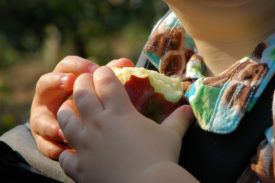Eric
This Wall Street Journal article on the decline of coal in Kentucky is worth absorbing, especially when paired with an account of the boom in the Bakken oil fields, like this one in the Spokane Spokesman-Review. They are a good reminder that there’s a powerful story of human immiseration and desperation that the fossil fuel economy solves. It may ultimately be a short term and destructive “solution,” but the jobs are real and they support real lives and families. In some ways, I think this is the greatest challenge facing those of us in pursuit of a climate-stable future.
I’m late coming to it, but I was absolutely bowled over by Peter Gary’s essay, The Play Deficit. He explores what scientific research tells us about the consequences of children today playing less frequently than we used to in unstructured and unsupervised environments:
According to Kim’s research, all aspects of creativity have declined, but the biggest decline is in the measure called ‘creative elaboration’, which assesses the ability to take a particular idea and expand on it in an interesting and novel way. Between 1984 and 2008, the average elaboration score on the TTCT, for every grade from kindergarten onwards, fell by more than one standard deviation. Stated differently, this means that more than 85 per cent of children in 2008 scored lower on this measure than did the average child in 1984. If education ‘reformers’ get their way, it will decline further still as children are deprived even more of play. Other research, by the psychologist Mark Runco and colleagues at the Torrance Creativity Center at the University of Georgia, shows that scores on the TTCT are the best childhood predictors we have of future real-world achievements. They are better predictors than IQ, high-school grades, or peer judgments of who will achieve the most.
Though some of it was new to me, much of it struck me as both obvious and profound. It’s worth quoting at length:
The reason why play is such a powerful way to impart social skills is that it is voluntary. Players are always free to quit, and if they are unhappy they will quit. Every player knows that, and so the goal, for every player who wants to keep the game going, is to satisfy his or her own needs and desires while also satisfying those of the other players, so they don’t quit. Social play involves lots of negotiation and compromise…
Watch any group of children in play and you will see lots of negotiation and compromise. Preschoolers playing a game of ‘house’ spend more time figuring out how to play than actually playing. Everything has to be negotiated — who gets to be the mommy and who has to be the baby, who gets to use which props, and how the drama will unfold. The skilled players use tag questions to turn their assertions into requests: ‘Let’s pretend that the necklace is mine. OK?’ If it’s not OK, a discussion ensues.
Or watch an age-mixed group of children playing a ‘pickup’ game of baseball. A pickup game is play, because it’s directed by the players themselves, not by outside authorities (coaches and umpires) as a Little League game would be. The players have to choose sides, negotiate rules to fit the conditions, decide what’s fair and foul. They have to co-operate not just with the players on their team, but also with those on the other team, and they have to be sensitive to the needs and abilities of all the players. Big Billy might be the best pitcher, but if others want a turn at pitching he’d better let them have it, so they don’t quit. And when he pitches to tiny Timmy, who is just learning the game, he’d better toss the ball gently, right toward Timmy’s bat, or even his own teammates will call him mean. When he pitches to walloping Wally, however, he’d better throw his best stuff, because Wally would feel insulted by anything less. In the pickup game, keeping the game going and fun for everyone is far more important than winning.
The golden rule of social play is not ‘Do unto others as you would have them do unto you.’ Rather, it’s something much more difficult: ‘Do unto others as they would have you do unto them.’
For me, watching these dramas unfold and ethical codes develop is one of the most wonderful and mysterious delights of raising a kid.
As a piece of popular science writing, I thoroughly enjoyed this article on the mating habits of early hominins. There’s so much we don’t yet know about the history of our species and our connection to the other near-human species like Neanderthals that we once shared the earth with. If you had to boil down the relationship to a single phrase it would undoubtedly be, “it’s complicated.”
Yet more evidence that multivitamins do basically nothing for healthy adults. The question is whether they’re actually harmful.
I recommend Matt Taibbi on the collapse of Camden.
The word “sweater” is, in fact, gross.








